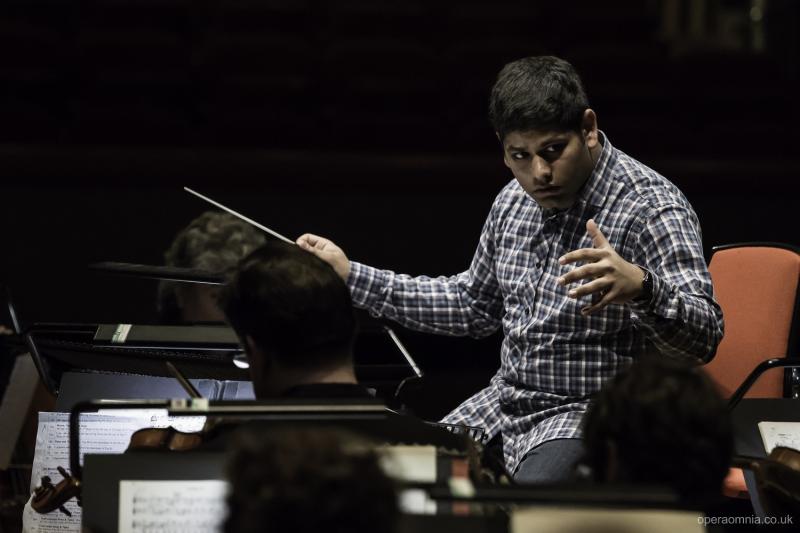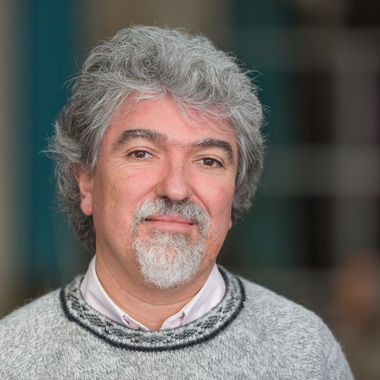Vassallo, CBSO, Chauhan, Symphony Hall Birmingham | reviews, news & interviews
Vassallo, CBSO, Chauhan, Symphony Hall Birmingham
Vassallo, CBSO, Chauhan, Symphony Hall Birmingham
Compelling Shostakovich and a Golijov premiere from a young British conductor

Funny thing, musical fashion. Most listeners would call Borodin’s Polovtsian Dances a popular classic – yet before tonight, I doubt they’d had a professional performance in Birmingham this century. Then there’s the case of Osvaldo Golijov. Remember him?
It owed this performance to the CBSO’s assistant conductor Alpesh Chauhan and principal cello Eduardo Vassallo (pictured below right) – the central panel of a fascinatingly conceived programme that concluded with Shostakovich’s Fifteenth Symphony. For a young conductor making his official CBSO main season debut (Chauhan stood in for an indisposed Andris Nelsons late last season), these were bold, self-denying choices – and after seven years of Nelsons’s meat-and-potatoes programming, a welcome return to the kind of musical adventure Birmingham was offered each week under Sakari Oramo and Simon Rattle.
This was something of a homecoming gig for Chauhan, and the warmth in the hall was genuine As for Azul itself, it’s a 30-minute, single-movement arc for solo cello and an orchestra augmented by accordion, exotic percussion and occasional eerie touches of electronics. Golijov’s notion, apparently, is to “evoke the majesty of certain Baroque adagios”, with the cello less a virtuoso soloist than a leading voice, and the extra instruments serving as a kind of continuo section. In practice, this meant stretches of lush, harmonically static music broken by jagged, gradually building rhythmic ostinatos, fading at length to a horn-coloured sunset and a long, sliding final sigh.  Vassallo played with a sweet, glowing tone and evident commitment in music that didn’t sound particularly grateful for the cello (Golijov cites Berlioz’s Harold in Italy as a model). The lyrical opening section seemed to work best, making an effect somewhere between Tavener’s The Protecting Veil and one of those "Rainforest Moods" relaxation CDs they sell at garden centres. The audience gave it a standing ovation – almost unheard of at a CBSO concert.
Vassallo played with a sweet, glowing tone and evident commitment in music that didn’t sound particularly grateful for the cello (Golijov cites Berlioz’s Harold in Italy as a model). The lyrical opening section seemed to work best, making an effect somewhere between Tavener’s The Protecting Veil and one of those "Rainforest Moods" relaxation CDs they sell at garden centres. The audience gave it a standing ovation – almost unheard of at a CBSO concert.
But then, that was the spirit of the evening. Chauhan had set the mood with a flying, joyously balletic account of the Polovtsian Dances: springy, vividly colourful and delivered without a trace of self-indulgence. And laughter ran through the audience as he stepped down to adjust Vassallo’s music stand before Azul. “I was his student – some things never change,” he explained. As a product of Birmingham’s schools music service and a former cellist in the CBSO Youth Orchestra, this was something of a homecoming gig for Chauhan, and the warmth in the hall was genuine.
But that can’t account for the impression that Chauhan has made in recent seasons with orchestras as far apart as Scotland, Finland and Italy; nor is it enough to explain the sense of atmosphere and quiet power that he generated in Shostakovich’s Fifteenth Symphony. Objective was the first word that came to mind, faced with the no-nonsense way in which he assembled the puzzle of the first movement, and the poker face with which the CBSO players delivered Shostakovich’s musical jokes. In the Adagio, though, Chauhan placed each each muted brass chord and grumbling bass line in its own space like a sculptor assembling an installation – then without forcing anything, simply let the climax erupt from the bottom of the orchestra. The effect was overwhelming, helped by Chauhan’s decision to place the basses at the back of the orchestra. In Symphony Hall, the frontal advance of that great wall of black sound really gets you in the gut.
That same discreet understanding and large-scale vision underpinned the whole performance. Chauhan let his players play, and Adrian Spillett’s percussion team, in particular, worked little miracles of delicacy and precision. But Chauhan is one of those conductors who makes every phrase and detail sound like it’s communicating something – and he possesses that magical, Beecham-like knack for making even rests sing. The result, at the end of Shostakovich’s unanswered question of a finale, was a 30-second silence that spoke louder than any ovation. A remarkable achievement from a young conductor of intelligence and courage – and musicianship enough to justify both.
rating
Explore topics
Share this article
The future of Arts Journalism
You can stop theartsdesk.com closing!
We urgently need financing to survive. Our fundraising drive has thus far raised £49,000 but we need to reach £100,000 or we will be forced to close. Please contribute here: https://gofund.me/c3f6033d
And if you can forward this information to anyone who might assist, we’d be grateful.

Subscribe to theartsdesk.com
Thank you for continuing to read our work on theartsdesk.com. For unlimited access to every article in its entirety, including our archive of more than 15,000 pieces, we're asking for £5 per month or £40 per year. We feel it's a very good deal, and hope you do too.
To take a subscription now simply click here.
And if you're looking for that extra gift for a friend or family member, why not treat them to a theartsdesk.com gift subscription?
more Classical music
 Bizet in 150th anniversary year: rich and rare French offerings from Palazzetto Bru Zane
Specialists in French romantic music unveil a treasure trove both live and on disc
Bizet in 150th anniversary year: rich and rare French offerings from Palazzetto Bru Zane
Specialists in French romantic music unveil a treasure trove both live and on disc
 Scottish Chamber Orchestra, Ibragimova, Queen’s Hall, Edinburgh review - rarities, novelties and drumrolls
A pity the SCO didn't pick a better showcase for a shining guest artist
Scottish Chamber Orchestra, Ibragimova, Queen’s Hall, Edinburgh review - rarities, novelties and drumrolls
A pity the SCO didn't pick a better showcase for a shining guest artist
 Kilsby, Parkes, Sinfonia of London, Wilson, Barbican review - string things zing and sing in expert hands
British masterpieces for strings plus other-worldly tenor and horn - and a muscular rarity
Kilsby, Parkes, Sinfonia of London, Wilson, Barbican review - string things zing and sing in expert hands
British masterpieces for strings plus other-worldly tenor and horn - and a muscular rarity
 From Historical to Hip-Hop, Classically Black Music Festival, Kings Place review - a cluster of impressive stars for the future
From quasi-Mozartian elegance to the gritty humour of a kitchen inspection
From Historical to Hip-Hop, Classically Black Music Festival, Kings Place review - a cluster of impressive stars for the future
From quasi-Mozartian elegance to the gritty humour of a kitchen inspection
 Shibe, LSO, Adès, Barbican review - gaudy and glorious new music alongside serene Sibelius
Adès’s passion makes persuasive case for the music he loves, both new and old
Shibe, LSO, Adès, Barbican review - gaudy and glorious new music alongside serene Sibelius
Adès’s passion makes persuasive case for the music he loves, both new and old
 Anja Mittermüller, Richard Fu, Wigmore Hall review - a glorious hall debut
The Austrian mezzo shines - at the age of 22
Anja Mittermüller, Richard Fu, Wigmore Hall review - a glorious hall debut
The Austrian mezzo shines - at the age of 22
 First Person: clarinettist Oliver Pashley on the new horizons of The Hermes Experiment's latest album
Compositions by members of this unusual quartet feature for the first time
First Person: clarinettist Oliver Pashley on the new horizons of The Hermes Experiment's latest album
Compositions by members of this unusual quartet feature for the first time
 Gesualdo Passione, Les Arts Florissants, Amala Dior Company, Barbican review - inspired collaboration excavates the music's humanity
At times it was like watching an anarchic religious procession
Gesualdo Passione, Les Arts Florissants, Amala Dior Company, Barbican review - inspired collaboration excavates the music's humanity
At times it was like watching an anarchic religious procession
 Classical CDs: Camels, concrete and cabaret
An influential American composer's 90th birthday box, plus British piano concertos and a father-and-son duo
Classical CDs: Camels, concrete and cabaret
An influential American composer's 90th birthday box, plus British piano concertos and a father-and-son duo
 Cockerham, Manchester Camerata, Sheen, Martin Harris Centre, Manchester review - re-enacting the dawn of modernism
Two UK premieres added to three miniatures from a seminal event of January 1914
Cockerham, Manchester Camerata, Sheen, Martin Harris Centre, Manchester review - re-enacting the dawn of modernism
Two UK premieres added to three miniatures from a seminal event of January 1914
 Kempf, Brno Philharmonic, Davies, Bridgewater Hall, Manchester review - European tradition meets American jazz
Bouncing Czechs enjoy their Gershwin and Brubeck alongside Janáček and Dvořák
Kempf, Brno Philharmonic, Davies, Bridgewater Hall, Manchester review - European tradition meets American jazz
Bouncing Czechs enjoy their Gershwin and Brubeck alongside Janáček and Dvořák
 Solomon, OAE, Butt, QEH review - daft Biblical whitewashing with great choruses
Even a top soprano and mezzo can’t make this Handel paean wholly convincing
Solomon, OAE, Butt, QEH review - daft Biblical whitewashing with great choruses
Even a top soprano and mezzo can’t make this Handel paean wholly convincing

Add comment